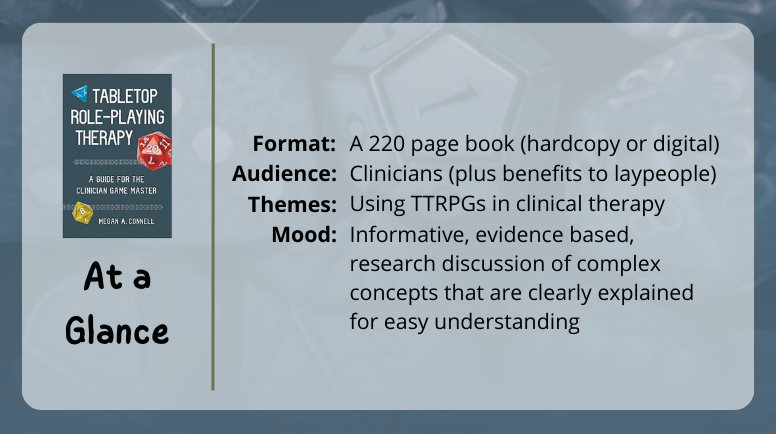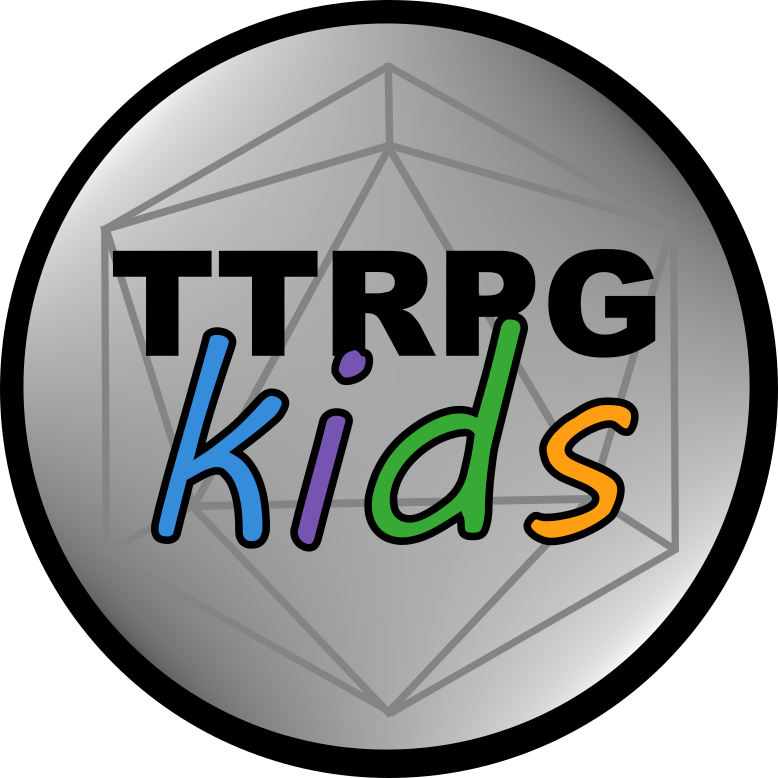Review of Tabletop Role-Playing Therapy: A Guide for the Clinician Game Master
Jump to:
- What is Tabletop Role-Playing Therapy?
- Who would Tabletop Role-Playing Therapy be great for?
- How Tabletop Role-Playing Therapy can also be used by non-clinicians
- Overall thoughts on Tabletop Role-Playing Therapy
- Find a copy of Tabletop Role-Playing Therapy
Note: This post may contain affiliate links. At no additional cost to you, I may earn a small commission from purchases made using them. TTRPGkids uses this to keep the site going. Read full disclosure here.

What is Tabletop Role-Playing Therapy?
Tabletop Role-Playing Therapy: A Guide for the Clinician Game Master by Dr. Megan Connell is precisely what it says on the cover – it is a handbook that discusses the reasoning and evidence behind using TTRPGs in clinical and therapeutic settings while also providing a guide for how to establish these sessions based on best practices and tangible examples.
It has a particular focus on use with youth, while also covering everything from what a TTRPG is to specific diagnostic applications to running your first session… and much more. This guide also includes cited references to applicable research for further investigation, examples from an actual TTRPG group, and suggestions for further research, should you want to expand the field of clinically applied TTRPGs yourself.
Dr. Connell’s language is also technical but easy to understand (this is coming from a layperson), and the book is logically organized so it flows from one section to the next and builds comprehensive knowledge for the reader.
Who would Table Role-Playing Therapy be great for?
Tabletop Role-Playing Therapy is intended for use by clinicians and is arranged to explain what a TTRPG is while also emphasizing the importance of knowing your medium before using TTRPGs in a clinical setting, so it is usable by clinicians who are experienced or new to TTRPGs.
As a layperson, I also found this book very useful in understanding why TTRPGs have helped both in my life and in the growth I have seen with my kid. It gives me a better base that I can now connect observations to, so I could also see this being a useful knowledge source for families and educators who are using TTRPGs as well. As a note, it does very clearly specify in the book that the methods described are to be used by a clinician with appropriate training (so it is not intended for a parent or teacher, for example, to start a therapy-focused TTRPG at home or in the class), however, it does provide helpful insights to the non-clinician as to why we may see the growth that we do in the therapeutic moments that naturally occur in our games.
How Tabletop Role-Playing Therapy can also be used by non-clinicians
As I stated above, I am not a clinician, so, while I believe this is an excellent book for those trained in providing therapy, I don’t want to speak in that sense because I lack the technical background.
However, I am a neurodivergent parent to a neurodivergent child, and I have been using TTRPGs for the past couple years to help teach my child social skills. I also have been tweaking the classes that I teach to incorporate TTRPG elements that I’ve found beneficial to engagement with the subject material.
I see a lot of what I have learned and observed through that process broken down in Tabletop Role-Playing Therapy in a way that gives me words to express what I’ve been seeing. It’s helped me to understand what’s going on behind the scenes and to notice more during games with my kid and in the class that I teach.
Because of this, I feel that Tabletop Role-Playing Therapy can also be a wonderful tool to help non-clinicians grow their understanding of how TTRPGs are helping themselves or members of their group, provide additional motivation for starting a non-clinical TTRPG campaign, and help families or future clients who are seeking more engaging therapy to find a potential option that can help them.
In particular, I found the section on specific diagnoses very beneficial. It takes different diagnoses, like autism, ADHD, anxiety, and depression, and explains what they are, how TTRPGs can help, some challenges you may encounter with advice on how to handle them, and how to set the game up to achieve well defined therapeutic goals for that player. The advice given, like having fidget toys available, incorporating player interests, or different ways to encourage anxious players are lessons that are great for any GM to have in their toolbelt when they notice what’s happening at the game table. It can also help to have a better understanding of what your players may be dealing with internally so you can approach them with more empathy.
Again, if you’re not a clinician, you should not be running TTRPG therapy with your family, students, or players, however, this book can deepen your understanding of your “for fun” games and help with giving you language to discuss with your therapist so you can communicate effectively with them and have comfort in knowing the reasoning behind this particular therapy format.
My overall thoughts on Tabletop Role-Playing Therapy
Tabletop Role-Playing Therapy is an excellent resource for learning more about the therapeutic benefits of TTRPGs and how they can be applied in a clinical setting. It’s easy to understand despite covering complex concepts, and connects everything to solid research and examples. From personal experience and from observations with my kid, I believe that TTRPGs can be an amazing vehicle for bringing therapeutic benefits to players, and I appreciate how the book sets itself up to be a foundation for further research so there’s direction for this field to grow. I greatly enjoyed reading this guide, and I hope you find it as beneficial as I have!
Find a copy of Tabletop Role-Playing Therapy

You can find a copy of Tabletop Role-Playing Therapy through bookshop.org.
Also, check out my interview with Dr. Connell, the book’s author, here to find out more about her XP and work!
If you liked this post, make sure to subscribe to the TTRPGkids monthly newsletter to stay up to date on the latest reviews, tips and tricks, game and podcast list updates, and more! Thank you for playing tabletop RPGs with your kids and sharing this awesome hobby with the next generation!



1 thought on “Review of Tabletop Role-Playing Therapy: A Guide for the Clinician Game Master”